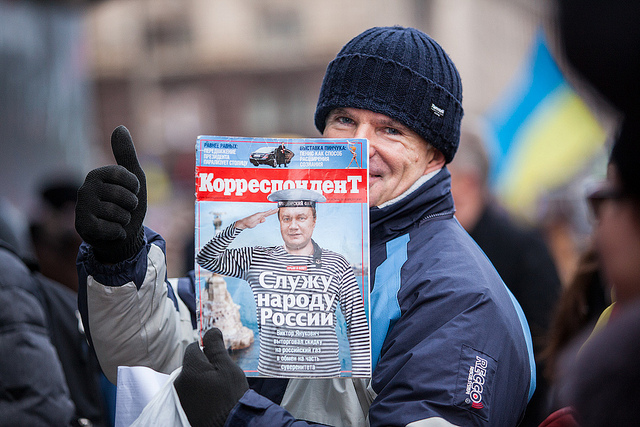The Economist is one of the rare news publications that are surviving, and thriving in the economic downturn.
It managed to set up an innovative digital product and keep its print version profitable. It enjoys the privilege of maintaining foreign bureaus and correspondents writing for it in Hong Kong, Nairobi, Moscow, Cairo, Brussels, Washington, and Los Angeles to name a few, as the rest of the newspaper industry undergoes a painful crunch.
Chief of its Berlin bureau, Andreas Kluth, sat down to talk about The Economist, what makes it unique, and where he sees the future.
The Economist has thought hard about how to deal with the fact that it is a weekly: it is published on a Friday while its audience has been reading news the entire week. ‘I cannot assume that people wait a week to get the Economist to find out what happened in Germany. If they are interested in Germany, they probably already know it and I have to do something else, to add value some other way,’ Kluth said.
What the Economist offers is quality news and a way to navigate a constant information stream. ‘You can be on Twitter all day long and it never stops. You do get tired eventually, it’s too much information, so many people just want something where they can let it go. It’s like a filter, you only want to get the important stuff and to be done with it,’ said Kluth.
The same idea of finiteness guided the development of newspaper’s app. ‘You can swipe with a finger through the pages and then you get to the end. And if you’ve been swiping through [on smartphone or tablet], you know there is this feeling. Readers tell us they really like this, because it feels like “I’m done! I can go play”. While many news apps never stop, they always update. You can keep going and the next time you refresh it, there is a news article. It’s a different proposition, and I like it too, but you can never be done.’
The Economist prides itself on being a global brand, and invests heavily in maintaining bureaus around the world. Many Western media outlets are cutting foreign correspondents, but Kluth is sanguine about the change. ‘I’m sure there’re fewer foreign correspondents from America, but probably more from China, India. They have raising middle class who want to read news and so they send people abroad,’ he said.
‘Back in the day journalists were famous for 3-hour lunches with Martinis. It was mostly men, not women, with few famous exceptions. It was more glamorous. There was more money available to more correspondents of more newspapers. Now there’s less of this, but you can’t get to zero. The New York Times will always have their foreign bureau here and in other places.’
The Economist has a huge advantage in the globalized world as an international newspaper published in English. This has both benefits and drawbacks. The main advantage, and uniqueness, is that the newspaper never was a local outlet and always catered to the global audience. The edition is read all over the world from the USA to Germany to China and Japan, with larger readership abroad than at home.
There is no doubt that English becoming a lingua franca has contributed to the newspaper’s prosperity in old and emerging economies: ‘It helps a lot to be English-speaking. For instance, we have a huge readership in India because basically they’re an English-speaking market. Despite the local languages, especially the intellectuals there tend to read, write, and learn in English. Probably, you won’t get a German-language newspaper going global any time soon.’
Yet, such cosmopolitanism poses a challenge to the reporters: they lose an intuitive understanding of audience’s mentality and expectations back home. Targeting a global audience requires a different set of skills. ‘This is hard as it takes certain kind of sensitivity. For instance, if I write about Germany, I have to figure out what is interesting simultaneously for someone in California, in Japan, in Finland maybe, and in Germany,’ said Kluth.
The position and prestige of different cities as a foreign posting destination change over time. During the Cold War Moscow and Washington were ‘two places where journalism careers were made’. In the 80s it was Tokyo and and now it is Beijing and Shanghai, but Berlin is newsworthy too. ‘Right now,’ Kluth believes, ‘Berlin is the most fascinating city in the world. The story right now in Germany is so interesting. People are more interested in Germany than they have been.’
Berlin is interesting right now, largely because of the Eurozone crisis. ‘And the perception is (I say perception because I think it’s only partially true), that Germany is the country, and specifically Angela Merkel is the woman, who fixes it or doesn’t fix it,’ said Kluth. ‘For instance at the Economist, we’ve put her on the cover several times, always with this cheeky humor like “are you gonna do something about it, Angela?” Germany, as the most powerful country in the EU, is perceived as a key to fixing the Eurocrisis. In China, the public doesn’t understand how EU works, and they think that if you want to talk to a person in power, you call Angela Merkel.’
Photo credit: Rukhshona Nazhmidinova
Tags: Andreas Kluth, Berlin, Germany, interview, Media economics, the Economist













































